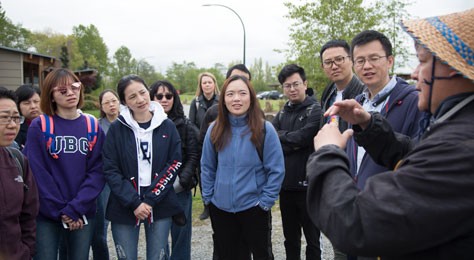
IMBA students from China visit Musqueam traditional territory to explore Vancouver's Indigenous roots

Every year, students enrolled in UBC Sauder’s IMBA program travel from China for a two-week visit to Vancouver as part of their academic experience. UBC Sauder faculty also visit Jiao Tong University in Shanghai to deliver a global learning experience in the classrooms. But this spring’s cohort witnessed a first — an introduction to the heritage of the Indigenous nation of Musqueam and their territory that hosts much of mainland Vancouver, including the campus of the University of British Columbia.
The delegation of 44 students spent a morning at the Musqueam reserve, the traditional territory of the hən̓q̓əmin̓əm̓-speaking Musqueam people located near the mouth of the Fraser River.
"We wanted the visiting students to understand a crucial piece of Canadian history," said Lauren Casey, Manager—Indigenous initiatives at UBC Sauder's Ch’nook Indigenous Business Education, who helped organize the visit. Casey has indigenous roots to the Haida community as a member of the Skidegate band.
"They may one day visit again or work here. And as business students, they will at some points in their lives work with Indigenous communities. Initiatives like these will hopefully give them the tools to better understand how to work with them in a respectful and engaged way."
Amongst the Musqueam in Vancouver, students went beyond a traditional classroom to learn about the rich culture and heritage of the people indigenous to the land. Decades worth of stories, wisdom, history and cultural practices passed down many generations serve to both forge an identity for the 1,300 Musqueam members, and also offer a teaching opportunity for visitors.
Students started the tour with a traditional welcome song at the Musqueam Cultural Centre. Representatives from the centre then gave them a tour of the ancestral territory and walked them to an embankment around the Fraser River where they learnt about significance of the waterways. The Fraser River has been integral to the Musqueam identity, shaping its culinary heritage as well as language.

Students also learned about the role of a longhouse on First Nations territories as a place for cultural gathering and celebrations, including important events like naming ceremonies. A trip to the Gallery introduced them to contemporary Indigenous art such as fishing net weaving and also an exhibition of objects and tools of cultural significance.
Larry Grant, a Musqueam Elder and an adjunct professor at UBC who was born and raised in the Musqueam traditional territory, also spoke at the event. Grant recounted a nugget of history from Musqueam territory that piqued the interest of the Chinese students. Until the 1960s, Cantonese-speaking farmers from China's Guangdong province cultivated flatlands along the Fraser River. Grant's own father was a Chinese farmer who married a Musqueam woman, which then led to Grant's immersion into Musqueam culture and his eventual role as a 'Knowledge Keeper' for the community.
The enriching tour included a performance by Coastal Wolf Pack, a cultural performance group out of Coast Salish territories. Both young and experienced performers use dance, songs and drums to pay homage to ancestors and offer them gratitude for passing down their cultural protocols and keeping their traditions alive.
Alec Dan, a cultural representative from the Musqueam nation who is part of the Coastal Wolf Pack performance group, said the visit from Chinese students was an opportunity to advance knowledge and raise awareness.
"It is important to get to know the indigenous people who reside in this territory. We're here to share with the people and let them know we're still here and we still practise our culture and pass it down to the younger members of our families," said Dan.
This sentiment also resonated with the students.
"I learnt so much about the history and culture of this place," said Scott KE, a visiting IMBA student. He said that exploring Indigenous roots of a place aligns with the quest for understanding business.
"As an international MBA student, we learn about different cultures and environments of work. We have to work towards resolving differences in culture and try to enhance the opportunities for different groups for their productivity and success."
Casey, Manager—Indigenous initiatives at Ch'nook, said that familiarizing oneself with the Indigenous identities and stories of another place helps in fostering understanding and empathy.
"Learning about another culture will allow the IMBA students to grow as people. It will make them better people when they enter the workforce or a business and they'll be more respectful of all cultures, not just Indigenous cultures."